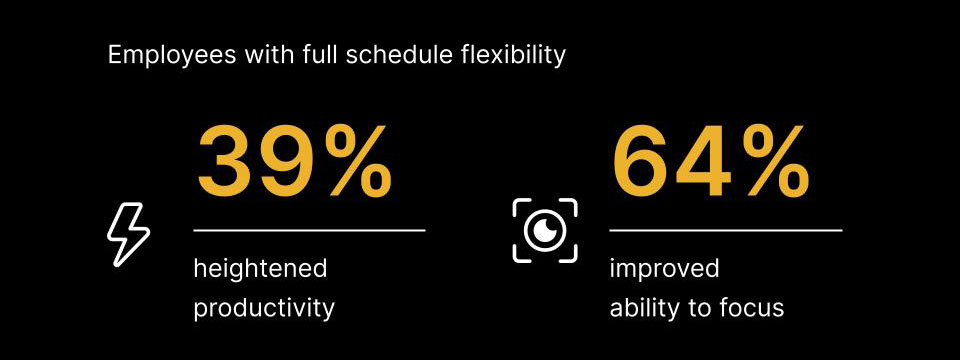As we enter the 21st century, the traditional working environment has evolved dramatically.
The old narrative suggested that being physically present in the office was a marker of dedication. However, the Future Forum Report indicates a shift in this perspective.
A significant player in this revolution? Flexible work arrangements.
The Future Forum’s Winter 2022-2023 Pulse Report offers invaluable insights. It presents compelling evidence that workplace flexibility – primarily via remote work – is more than just a trendy perk; it’s a fundamental pillar of a modern, successful company. Let’s delve into the findings:

Flexibility and a Thriving Company Culture
Over the past two years, flexible work policies have emerged as a critical factor in improving company culture. Employees who enjoy the freedom to work from various locations feel equally or more connected to their teams than their office-bound counterparts. These flexible workers feel a deeper bond with their direct supervisors and a greater alignment with their company’s values.
What does this mean for you as a business leader? Implementing flexible work policies, particularly those that enable remote work, could be your golden ticket to nurturing a strong, cohesive team.
Flexibility as a Tool Against Burnout
Burnout is reaching critical worldwide, with 42% of employees globally reporting feelings of burnout – the highest since the Future Forum began tracking it in May 2021.
Here’s where remote work comes in: Employees dissatisfied with their flexibility are a staggering 43% more likely to report burnout. Allowing employees to work remotely gives them the freedom to maintain a better work-life balance, potentially reducing burnout.
Busting the Myths: Flexibility and Productivity
Some executives fear flexible work arrangements, and incredibly remote work, might decrease productivity. However, the Future Forum Report busts this myth: it reveals that flexibility in work schedules boosts productivity, particularly among those who can choose their work hours.
So, it seems the key to higher productivity might not be fixed hours in an office but the ability for employees to work when and where they’re most effective.
In Conclusion
The evidence is clear: As we navigate new ways of working, flexibility, primarily via remote work, emerges as a crucial factor. It fosters a strong company culture, reduces burnout, and boosts productivity.
It’s time we leave behind our biases against flexible work and recognize it as the transformative force it is. Business leaders must strive to facilitate remote work, ensuring an inclusive, efficient, and balanced work environment that aligns with the changing needs of their workforce.
The shift is evident: the modern workplace isn’t just about the 9-to-5 grind in an office anymore, but about creating a dynamic, flexible work culture. If you haven’t already, it’s time to jump on the remote work bandwagon and give your employees the necessary flexibility!

Leave a Reply